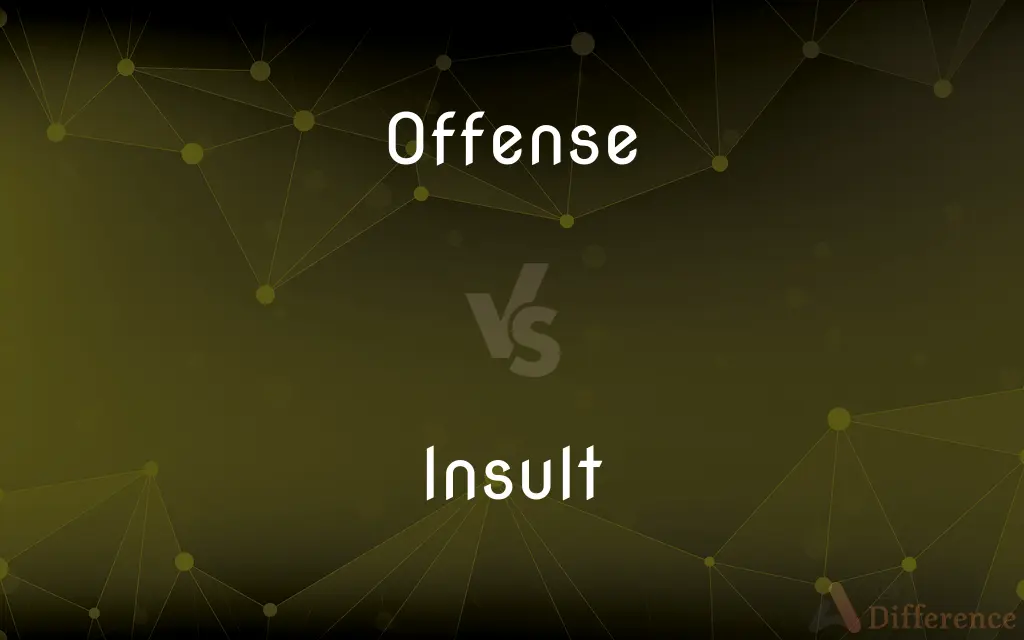Offense vs. Insult — What's the Difference?
By Tayyaba Rehman — Updated on September 14, 2023
An offense is a breach of a law or rule; an insult is a disrespectful or scornful remark or action. Offenses can be unintentional and insults are often viewed as intentional.

Difference Between Offense and Insult
Table of Contents
ADVERTISEMENT
Key Differences
An offense often relates to the violation of a specific set of rules, laws, or standards. It encompasses a broad range of transgressions, from misdemeanors to felonies. Conversely, an insult is typically an action or remark that disrespects or belittles another individual, potentially hurting their feelings or dignity.
Offenses are usually punishable by law or an organization's regulations. Penalties can range from fines to imprisonment, depending on the nature and severity of the offense. In contrast, an insult, while potentially hurtful, does not generally carry legal penalties, unless it falls under defamation or slander.
When someone commits an offense, they have essentially broken a rule or law established by society or an institution. On the other hand, insulting someone often pertains to personal boundaries and respect, and it doesn't necessarily mean a rule or law was broken.
Furthermore, while offenses can be unintentional, such as accidentally committing a minor traffic violation, insults are often viewed as intentional, deliberate acts meant to demean or disrespect. However, it's worth noting that not all insults are intentional; sometimes, miscommunication can lead to perceived insults.
Comparison Chart
Nature
Violation of a law or rule.
Disrespectful or scornful remark/action.
ADVERTISEMENT
Consequences
Legal penalties or organizational sanctions.
Emotional harm; potential social repercussions.
Intention
Can be intentional or unintentional.
Often intentional, but can be accidental.
Scope
Broad: includes minor to major violations.
Personal: usually targeted at an individual's feelings.
Legal Implications
Often has legal consequences.
Typically no legal consequences unless slander or defamation.
Compare with Definitions
Offense
The act of attacking in conflict.
The team's offense was aggressive during the game.
Insult
An affront to one's self-esteem or dignity.
Refusing her handshake was a terrible insult.
Offense
A breach of a law or rule.
Speeding is a traffic offense.
Insult
A remark or action causing hurt or indignation.
Calling him incompetent was a clear insult.
Offense
A violation of moral or social code.
Lying is considered an offense in many cultures.
Insult
A derogatory or mocking statement.
That joke was an insult to his background.
Offense
The act of causing resentment or hurt.
His ignorance was an offense to her education.
Insult
Disrespectful or scornful treatment.
Mocking his accent was an unnecessary insult.
Offense
The act of causing anger, resentment, displeasure, or affront.
Insult
To treat with insolence or contempt.
Ignoring her presence was an insult she couldn't forget.
Offense
The state of being offended.
Insult
An insult is an expression or statement (or sometimes behavior) which is disrespectful or scornful. Insults may be intentional or accidental.
Offense
A violation or infraction of a moral or social code; a transgression or sin.
Insult
To treat with gross insensitivity, insolence, or contemptuous rudeness.
Offense
A transgression of law; a crime.
Insult
To affront or demean
An absurd speech that insulted the intelligence of the audience.
Offense
Something that outrages moral sensibilities
Genocide is an offense to all civilized humans.
Insult
(Obsolete) To make an attack on.
Offense
(ŏfĕns′) The act of attacking or assaulting.
Insult
To behave arrogantly.
Offense
The means or tactics used in attempting to score.
Insult
An insulting remark or act.
Offense
The team in possession of the ball or puck, or those players whose primary duty is to attempt to score.
Insult
(Medicine) A bodily injury, irritation, or trauma.
Offense
Scoring ability or potential.
Insult
Something that causes injury, irritation, or trauma
"the middle of the Bronx, buffeted and poisoned by the worst environmental insults that urban America can dish out" (William K. Stevens).
Offense
The act of offending.
Insult
(transitive) To be insensitive, insolent, or rude to (somebody); to affront or demean (someone).
Offense
A crime or sin.
Insult
To assail, assault, or attack; to carry out an assault, attack, or onset without preparation.
Offense
An affront, injury, or insult.
Insult
To behave in an obnoxious and superior manner (against or over someone).
Offense
The state of being offended or displeased; anger; displeasure.
Insult
To leap or trample upon.
Offense
A strategy and tactics employed when in position to score; contrasted with defense.
Insult
(uncountable) Action or form of speech deliberately intended to be rude; (countable) a particular act or statement having this effect.
Offense
The portion of a team dedicated to scoring when in position to do so; contrasted with defense.
Insult
(countable) Something that causes offence (for example, by being of an unacceptable quality).
The way the orchestra performed tonight was an insult to my ears.
Offense
The act of offending in any sense; esp., a crime or a sin, an affront or an injury.
Who was delivered for our offenses, and was raised again for our justification.
I have given my opinion against the authority of two great men, but I hope without offense to their memories.
Insult
Something causing disease or injury to the body or bodily processes; the injury so caused.
Offense
The state of being offended or displeased; anger; displeasure; as, to cause offense.
He was content to give them just cause of offense, when they had power to make just revenge.
Insult
An assault or attack; an assault, attack, or onset carried out without preparation.
Offense
A cause or occasion of stumbling or of sin.
Woe to that man by whom the offense cometh!
Insult
An act of leaping upon.
Offense
In any contest, the act or process of attacking as contrasted with the act of defending; the offensive; as, to go on the offense.
Insult
The act of leaping on; onset; attack.
Offense
The members of a team who have the primary responsibility to score goals, in contrast to those who have the responsibility to defend, i.e. to prevent the opposing team from scoring goal.
Insult
Gross abuse offered to another, either by word or act; an act or speech of insolence or contempt; a deprecatory remark; an affront; an indignity.
The ruthless sneer that insult adds to grief.
Offense
A lack of politeness; a failure to show regard for others; wounding the feelings or others
Insult
An injury to an organism; trauma; as, to produce an experimental insult to investigate healing processes.
Offense
A feeling of anger caused by being offended;
He took offence at my question
Insult
To leap or trample upon; to make a sudden onset upon.
Offense
A crime less serious than a felony
Insult
To treat with abuse, insolence, indignity, or contempt, by word or action; to abuse; as, to call a man a coward or a liar, or to sneer at him, is to insult him.
Offense
The team that has the ball (or puck) and is trying to score
Insult
To leap or jump.
Give me thy knife, I will insult on him.
Like the frogs in the apologue, insulting upon their wooden king.
Offense
The action of attacking an enemy
Insult
To behave with insolence; to exult.
The lion being dead, even hares insult.
An unwillingness to insult over their helpless fatuity.
Offense
An act that causes upset or annoyance.
His comments were taken as an offense by many.
Insult
A rude expression intended to offend or hurt;
When a student made a stupid mistake he spared them no abuse
They yelled insults at the visiting team
Insult
A deliberately offensive act or something producing the effect of an affront;
Turning his back on me was a deliberate insult
Insult
Treat, mention, or speak to rudely;
He insulted her with his rude remarks
The student who had betrayed his classmate was dissed by everyone
Common Curiosities
Are all Insults meant to harm?
Not necessarily; insults can be unintended due to miscommunication.
Are Offenses always legally punishable?
While many are, not all offenses carry legal consequences.
Can an Offense be unintentional?
Yes, offenses can be both intentional or unintentional.
Can an Insult lead to legal action?
In cases of defamation or slander, insults might lead to legal consequences.
What's worse, an Offense or an Insult?
It depends on context; legal offenses can have serious consequences, while insults can deeply hurt emotionally.
Is every Offense also an Insult?
No, offenses might be impersonal or systemic, while insults are typically personal.
Why are some Offenses not considered serious?
Some offenses, like minor traffic violations, might not harm others or have grave implications.
What constitutes an Insult?
An insult is a disrespectful or scornful remark or action towards someone.
What is an Offense?
An offense is a breach of a law, rule, or code of conduct.
How can one respond to an Insult?
Responses can range from confrontation to ignoring, depending on the situation and personal preference.
How can I avoid causing Offense?
By understanding and respecting laws, rules, and cultural norms.
Are insults culturally relative?
Yes, what's insulting in one culture might not be in another.
Do all societies view Offenses in the same light?
No, cultural, societal, and legal perceptions of offenses vary widely.
How are Offenses categorized in law?
Offenses can range from misdemeanors to felonies based on their severity.
Can an Insult be a compliment in disguise?
Sometimes, what's intended as a joke or tease might come off as an insult.
Share Your Discovery

Previous Comparison
Lucifer vs. Lucy
Next Comparison
Hostelry vs. HostelAuthor Spotlight
Written by
Tayyaba RehmanTayyaba Rehman is a distinguished writer, currently serving as a primary contributor to askdifference.com. As a researcher in semantics and etymology, Tayyaba's passion for the complexity of languages and their distinctions has found a perfect home on the platform. Tayyaba delves into the intricacies of language, distinguishing between commonly confused words and phrases, thereby providing clarity for readers worldwide.
















































